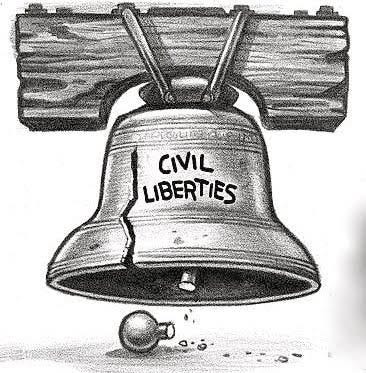Questions for Civil Libertarian Economists
Virtually all free-market economists are civil libertarians, staunch advocates of freedom of speech, religion, and the like. But in my experience, virtually all economists who eschew the “free-market” label are civil libertarians, too. Economists disagree about whether laissez-faire is the best economic policy. But laissez-faire in the market for ideas/culture enjoys across-the-board support.
This isn’t an easy pattern to understand. If you take market failure theories seriously, it’s child’s play to apply them expression. Negative externalities? Come on – many bloggers write for the sole purpose of offending others! Asymmetric information? Hey, if information were symmetric, what would be the point of sharing your thoughts with the world?
I’m curious about why economists so uniformly embrace civil liberties. But I’m especially curious about why so many non-libertarian economists end up being civil libertarians. So I’ll aim my questions at the latter group – but whatever your view, feel free to chime in.
Questions:
1. Are markets for ideas/culture less subject to market failure than other markets? Why or why not?
2. Is well-intended regulation of idea/culture markets more likely to have unintended negative consequences than well-intended regulation of other markets?
3. Is regulation of idea/culture markets less likely to be well-intended than regulation of other markets?
4. Is the average consumer a better judge of his own best interest in idea/culture markets than in other markets?
5. Is efficiency less normatively important in idea/culture markets than in other markets? If so, what normative goal(s) do we satisfy by sacrificing efficiency?
6. Should countries with weak civil liberties liberalize their regulation of idea/culture markets? If so, would you advocate “shock therapy”? Why or why not?
Just so you can’t accuse me of having a hidden agenda, let me state my agenda openly. I think that the typical social democratic economist’s arguments in favor of civil liberties are much weaker than the typical free-market economist’s arguments in favor of laissez-faire for the broader economy. If a free-market economist opposed regulation of the oil industry on the same grounds that the typical economist opposes regulation of religion, the typical economist would dismiss him as a “market fundamentalist.”
My challenge, then, is to defend laissez-faire in idea/cultural markets using arguments that you wouldn’t be embarassed to make in other markets. Can you do it?
The post appeared first on Econlib.



I suppose we can now say, 16 years on, that no, many were not in fact really all that in favor of free speech and other civil libertarian positions. At best we can probably say they were in favor of free speech only for those who agreed with them.
I will not answer the various questions posed by Bryan, but as an economist that is supportive of some types of regulation, more investment in public goods, and a modicum of re-distributive programs, let me give my perspective on the regulation of speech:
- Free speech is foundational to human dignity, to the exchange of ideas that allow for improvement of our lives and society, and to the functioning of democracy. So, the benefits of free speech are very large.
- One's speech may have negative externalities (e.g., some may feel distressed for hearing the opinions of others).
- However, in the interest of a healthier, robust society, I believe it is better to promote resilience to unwanted speech than to try to shelter those that dislike certain speech.
- Speech, on its own, is not violence. In cases where speech directly incites violence or in situations of direct interpersonal harassment (e.g., following someone in the street insulting the person), I do believe there is a limited role for the state to penalize it.
- Historically, regulation of speech is most associated with the most despotic regimes in the world (of the fascist, religious fanatic, or communist variety).
- Some modern democratic countries have some speech restrictions that go beyond those in the United States, but it is unclear to me that they get much benefit from them.
- In summary, from an utilitarian perspective, the benefits of free speech seem overwhelming larger than the benefits of regulating speech on most cases.
- Also, I believe that a "natural rights" ethical perspective favors a strong presumption in favor of free speech.
- This is a fundamentally different situation from regulating other externalities in the physical world (e.g., pollution), whose costs to the third parties can often significantly exceed the benefits to those engaging in the activity.
- Also, I believe that the regulation of externalities, like pollution, is unlikely have a similar slippery slope potential (of moving us towards an unfree society) as regulating speech.
- Stepping away from the utilitarian perspective, I (and I believe most people) do not see a right to pollute or generate harm to others as core to personal freedom as the right to speak freely.
- Our freedom ends where others freedom begins. But if you don't want to hear what someone has to say, just move along and don't listen :)